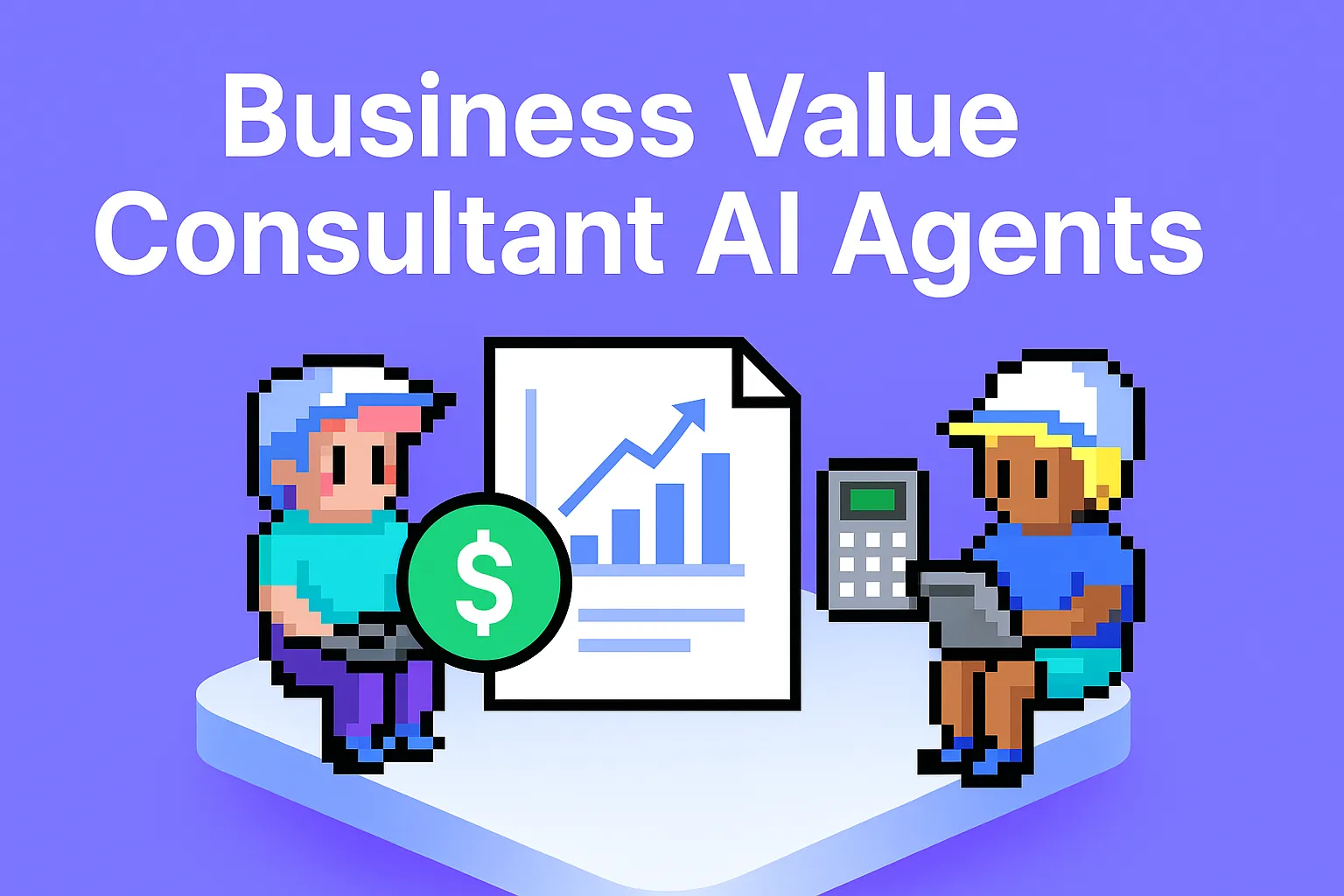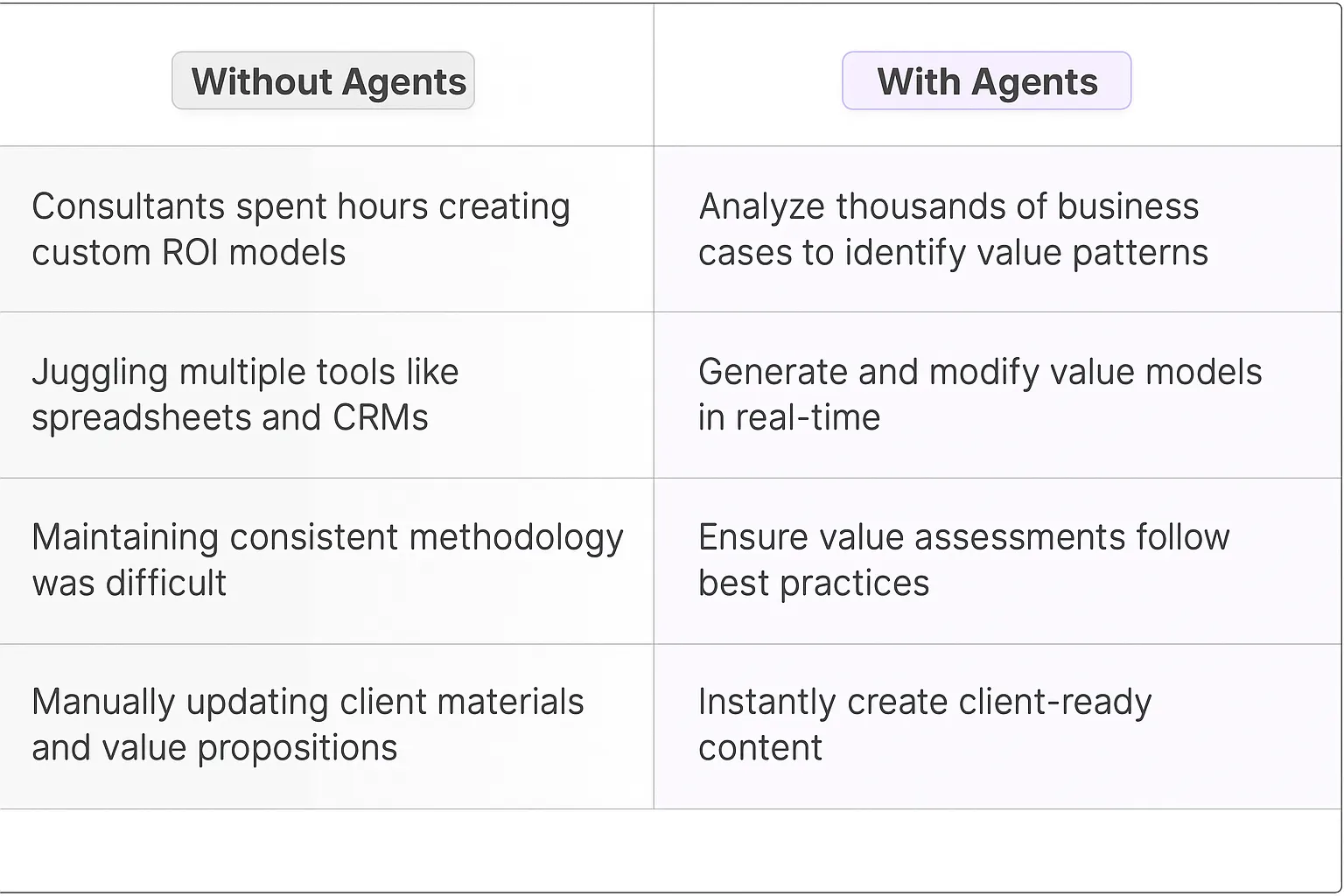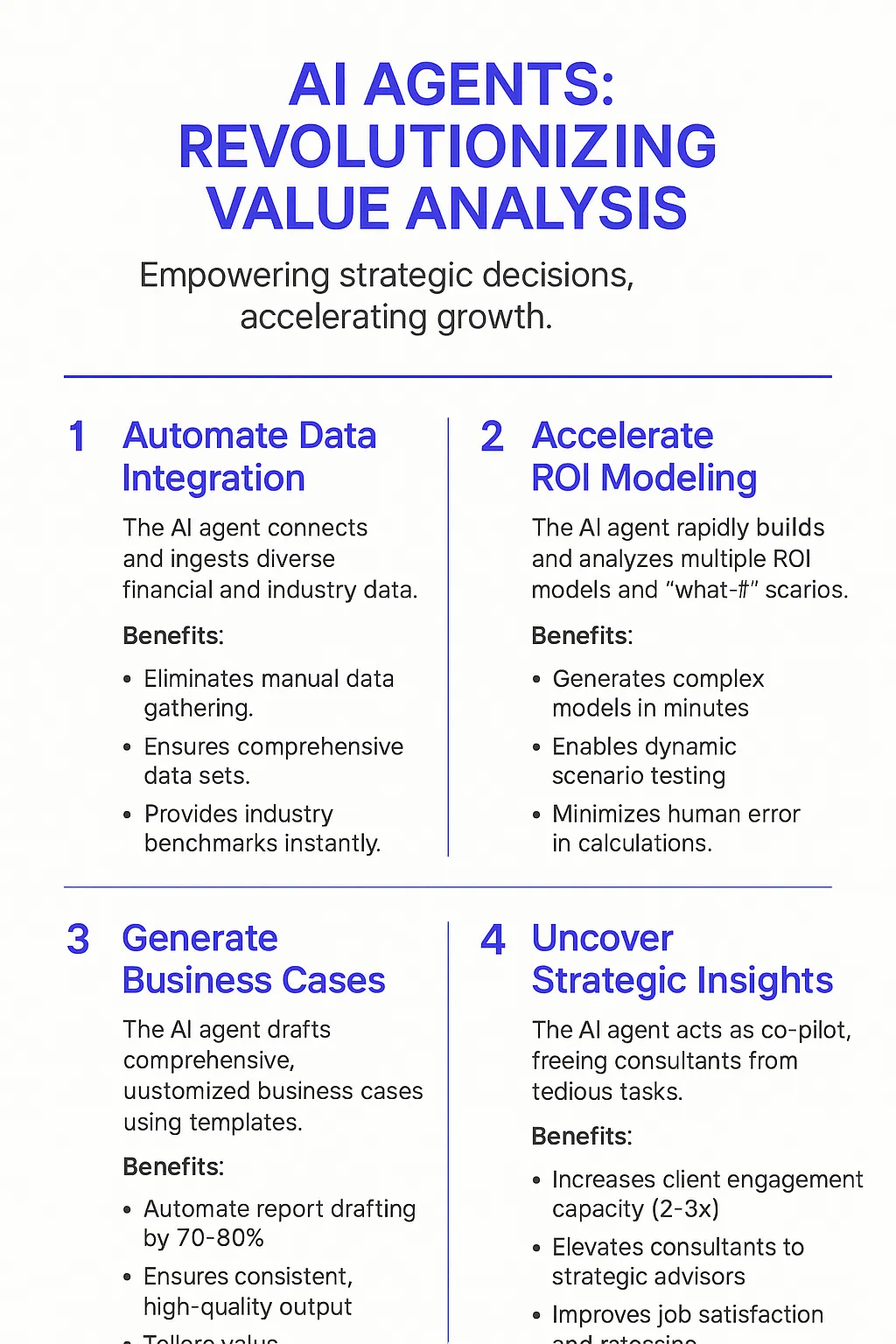Business Value Consultant AI Agents are specialized digital teammates that help organizations calculate, demonstrate, and communicate the financial impact of technology investments and business initiatives. They combine advanced analytics, natural language processing, and domain expertise to transform complex data into clear, compelling business cases. These sophisticated tools work alongside human consultants to analyze market trends, build financial models, and generate customized value propositions for specific client scenarios.

Traditional business value consulting relied heavily on manual processes that were both time-intensive and prone to inconsistencies. Consultants spent countless hours digging through spreadsheets, creating custom ROI models, and manually updating value propositions. They juggled multiple tools like Excel, PowerPoint, and various CRM systems while trying to maintain version control across client engagements.
The old approach meant consultants often got bogged down in administrative tasks instead of focusing on strategic thinking and client relationships. They'd spend days preparing for client meetings, gathering data points, and formatting presentations – time that could've been better spent on actual value creation.
Digital teammates fundamentally transform how business value consultants operate. They act as always-on analytical partners that can process vast amounts of historical deal data, industry benchmarks, and client-specific information in seconds. This shift creates several key advantages:
The real power comes from how AI Agents augment human expertise rather than replace it. They handle the heavy lifting of data analysis and content creation, enabling consultants to focus on strategic thinking and relationship building – the elements that truly drive business value.

When we look at the most successful B2B software companies, they've mastered the art of connecting technical capabilities to bottom-line impact. Business Value Consultant AI agents represent a fascinating evolution in this space.
The key insight here is the network effect created by each interaction. Every time these digital teammates engage in value analysis, they're not just crunching numbers – they're building a deeper understanding of industry-specific patterns, common objections, and successful value propositions.
What makes this particularly powerful is the compound learning effect. Traditional business value consultants might handle 50-100 cases per year. AI agents can process thousands, identifying subtle patterns and correlations that human analysts might miss. This creates a flywheel effect where each analysis makes subsequent ones more nuanced and industry-specific.
The most interesting applications aren't about replacing human consultants – they're about augmenting them with data-driven insights and pattern recognition at scale. This shifts the consultant's role from spreadsheet manipulation to strategic guidance and relationship building.

Business Value Consultants are experiencing a fundamental shift in how they analyze, model, and deliver strategic recommendations to clients. AI agents act as force multipliers for consultants - handling data processing, scenario modeling, and insight generation at a scale previously impossible. The versatility of AI agents in Business Value Consulting creates opportunities across multiple sectors and engagement types.
When I talk to consulting teams adopting AI agents, they're seeing 2-3x gains in productivity, particularly in areas like financial modeling, competitive analysis, and market sizing. The key isn't just raw processing power - it's the ability to iterate rapidly on complex business hypotheses while maintaining analytical rigor.
The most successful consulting teams are using AI agents as collaborative partners that enhance rather than replace human expertise. They're finding that AI excels at tasks like normalizing disparate datasets, running sensitivity analyses across hundreds of scenarios, and surfacing non-obvious patterns in market research - all while consultants focus on strategic interpretation and client relationships.
This shift mirrors what we saw in the software development world with the introduction of advanced IDEs and debugging tools - they didn't replace developers, but dramatically amplified their capabilities. The same transformation is happening now in business value consulting, creating opportunities for firms willing to embrace this new paradigm.
When healthcare organizations evaluate new technology investments, the complexity can be overwhelming. A Business Value Consultant AI Agent becomes an invaluable digital teammate for healthcare technology vendors and consultants working to demonstrate ROI to hospital systems.
Take the example of implementing a new patient scheduling system. The AI agent analyzes historical data from similar deployments, factoring in variables like hospital size, patient volume, and current scheduling inefficiencies. It then builds a detailed financial model showing both hard and soft cost savings.
The agent digs deeper than traditional ROI calculations by considering second-order effects: reduced patient no-shows leading to better provider utilization, improved patient satisfaction scores affecting value-based care payments, and decreased staff burnout from more efficient workflows. These nuanced insights help paint the complete value picture.
What's particularly powerful is how the agent adapts its analysis in real-time during customer conversations. When a hospital executive mentions their specific challenges with Medicare reimbursement rates, the agent immediately adjusts calculations to highlight relevant cost savings. This dynamic modeling helps bridge the gap between vendor promises and hospital realities.
The agent also identifies risks and implementation prerequisites that could impact value realization. For example, it might flag that achieving full ROI requires hitting certain staff training milestones or maintaining specific patient adoption rates. This transparent approach builds trust and sets realistic expectations.
By combining deep healthcare domain knowledge with sophisticated financial modeling, the Business Value Consultant AI Agent transforms abstract technology benefits into concrete dollars and cents - exactly what healthcare decision makers need to see.
Manufacturing executives face intense pressure to modernize their operations while controlling costs. I've seen firsthand how Business Value Consultant AI Agents are transforming the capital expenditure evaluation process for factory automation projects.
A recent case with a mid-sized auto parts manufacturer illustrates this perfectly. The company was evaluating a $12M investment in automated guided vehicles (AGVs) for their warehouse operations. The AI agent pulled data from 50+ similar implementations, creating a multi-dimensional analysis that went far beyond basic payback calculations.
The agent identified hidden value drivers that human analysts often miss. It quantified the impact of reduced forklift accidents (saving $430K annually in insurance premiums), calculated energy savings from optimized routing ($180K/year), and modeled productivity gains from 24/7 operations (38% throughput increase).
What's fascinating is how the agent adapted its analysis based on the manufacturer's unique constraints. When discussing their unionized workforce, it automatically adjusted the model to account for labor agreement requirements and showed how AGVs could be deployed to complement rather than replace workers - shifting them to higher-value tasks.
The agent also built a detailed risk matrix, highlighting potential bottlenecks like charging station placement and WiFi dead zones that could impact ROI. It generated a month-by-month value realization timeline tied to specific operational milestones, giving executives clear visibility into when and how benefits would materialize.
Most impressively, the agent created multiple investment scenarios - from a phased rollout to a full deployment - with corresponding NPV and IRR calculations. This allowed the manufacturer to find the sweet spot between investment size and expected returns, ultimately leading to a successful $8M initial implementation with documented 31% ROI in year one.
Building effective Business Value Consultant AI agents requires overcoming several complex technical hurdles. The agent needs to process and understand vast amounts of financial data, market research, and industry trends while maintaining contextual awareness across multiple conversations. Training these models demands extensive datasets of real business value conversations and negotiations - data that's often confidential and hard to obtain.
The agent must also handle nuanced financial calculations and ROI projections in real-time while explaining complex concepts in accessible terms. This requires sophisticated natural language processing capabilities combined with mathematical precision. Getting this balance wrong can lead to misaligned recommendations or confused stakeholders.
Organizations implementing Business Value Consultant agents face several operational hurdles. Sales teams may resist adoption if they view the agent as threatening their role rather than enhancing it. Clear change management and training programs become essential to demonstrate how the agent amplifies human capabilities rather than replacing them.
Data privacy presents another significant challenge. The agent needs access to sensitive business metrics and customer information to provide meaningful insights. Organizations must implement robust security protocols and carefully consider which data points to expose to the agent.
Successful deployment depends heavily on smooth integration with existing systems. The agent needs clean data pipelines from CRM systems, financial databases, and business intelligence tools. Many organizations struggle with fragmented data sources and inconsistent formatting, requiring significant cleanup work before the agent can deliver reliable insights.
API connections must be built and maintained to ensure real-time access to pricing information, customer histories, and market data. This often involves complex technical work and ongoing maintenance to keep integrations functioning properly as underlying systems evolve.
Maintaining high-quality outputs from Business Value Consultant agents requires continuous monitoring and refinement. Organizations need processes to catch and correct any biased or incorrect recommendations before they reach customers. Regular audits of agent interactions help identify areas where the model needs additional training or where human oversight should be increased.
The dynamic nature of business environments also means that the agent's knowledge base must be regularly updated with new market conditions, pricing changes, and evolving value propositions. This ongoing maintenance requires dedicated resources and clear update protocols.
The adoption of Business Value Consultant AI Agents marks a pivotal shift in how organizations approach ROI analysis and value demonstration. These digital teammates aren't just making existing processes faster - they're fundamentally changing how we uncover, quantify, and communicate business value. The most successful implementations will come from organizations that view these tools as amplifiers of human expertise rather than replacements. As these systems continue to evolve, they'll become increasingly essential for any organization serious about data-driven decision making and value-based selling.